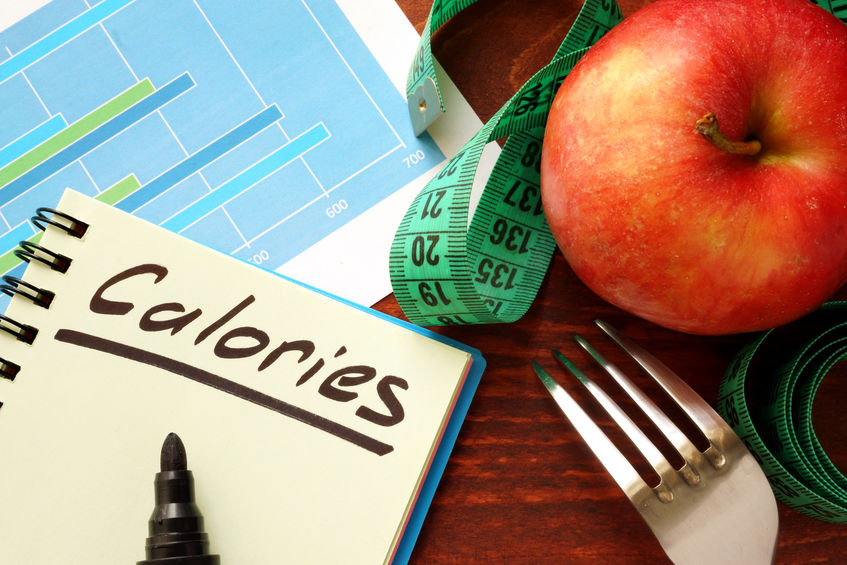If you’re involved in a weight loss program, you’re probably counting calories on a regular basis. But do calories matter when you’re trying to lose weight or is more about portion control?
The answer isn’t that all the simple…
Here’s a look at what calories actually are, and how they play a role in either helping people lose weight, or hindering their weight loss goals.
What Are Calories & Do Calories Matter?
A calorie, in a nutshell, is the amount of energy contained in a certain drink or food. When you consume more calories than you burn off through physical activity, the body stores them as fat. When the opposite is true, you have a calorie deficit,1 which will lead to weight loss.
In order to maintain a healthy weight, you need to consume a certain amount of calories each day. Men should strive to get about 2,500 calories, while women need about 2,000 daily, on average.2
Quality Matters
A lot of people trying to meet their weight loss goals obsess over their calorie intake. But the quality of the calories consumed is more important than a number, according to one study.
The key for people who lose weight, according to the researchers who conducted the study, is in the kinds of calories they put in their bodies.
Researchers analyzed the progress of 21 overweight or obese adults who were put on three different diets. The goal was to help them lose a minimum of 12.5 percent of their body weight. They followed each diet for a month.
The first diet was designed to help the participants lower their dietary fat by concentrating on eating fruits, vegetables, and whole grains.
The second diet allowed them to consume more fat and protein, but reduced carbohydrates. The participants substantially lowered their intake of pastas, bread, and other carbs.
Finally, the third diet focused on reducing the participants’ blood sugar levels. They didn’t need to reduce the carbohydrates or fat they ate. Instead, the researchers asked them to focus more on the quality of the carbs they ingested. For example, they replaced starchy vegetables and certain grains with fruits, legumes, and foods that contained healthy fats.
According to the results, the participants who followed the low-blood sugar and low-carbohydrate diets burned more calories than when they followed the low-fat diet.
While the low-carb diet was more effective in burning calories, it also created some concerning health issues. The researchers noted an increase in cortisol, a stress hormone that can increase the risk of cardiovascular disease and other problems.
The low-blood sugar level diet seemed to be the safest, according to the study. Participants burned fewer calories than when they were on the low-carb diet, but they didn’t show signs of an increase in stress hormones.
The significance of the study, according to the researchers, is that a low-fat diet might not be as effective a weight loss program than once thought. They believe that people trying to lose weight should reduce their consumption of highly processed carbohydrates. These include foods such as white rice and white bread. These types of foods, the researchers say, contribute to a roller coaster effect when it comes to blood sugar. They make levels surge and then crash, which can make it very hard to lose weight.3
Are Calorie Labels Trustworthy?
Conventional wisdom dictates that you should always be able to find out how many calories you’re consuming by looking at the product label. But research suggests that information might not be accurate.
The calorie information on food labeling, some researchers believe, is based on dated, flawed information. This information is based largely on 19th century findings of the amount of energy people receive from the food they eat. New findings indicate this approach might be too simplistic.4
In order to correctly calculate the true amount of calories someone ingests from a certain type of food, researchers say, a lot of different factors need to be taken into account.
For instance, how do different methods of food preparation (baking, microwaving, boiling, etc.) affect a food’s structure? How much energy does it take the body to digest different kinds of food? What kind of effect does the bacteria found in our gastrointestinal tract (also known as the “gut”) have on the calories taken in?
Nutritionists are trying to take these factors into consideration when determining caloric information on food labels. Unfortunately, digestion is such a complex process, they may never be able to completely figure it out.5
 One example of a discrepancy involves almonds. U.S. scientists found that while labels for most brands of almonds state they contain 170 calories per serving, the actual number is 129. They reached this conclusion after studying people following the same diet. The subjects ate basically the same things, with the exception of almonds. Some people ate more; others ate less. Researchers measured the amount of unused calories that passed through their system, and the discrepancy was discovered.6
One example of a discrepancy involves almonds. U.S. scientists found that while labels for most brands of almonds state they contain 170 calories per serving, the actual number is 129. They reached this conclusion after studying people following the same diet. The subjects ate basically the same things, with the exception of almonds. Some people ate more; others ate less. Researchers measured the amount of unused calories that passed through their system, and the discrepancy was discovered.6
Talking to Your Doctor About a Weight Loss Program
The key to weight loss is achieving a calorie deficit. You want to burn more calories than you consume.7 But you probably can’t do this through diet alone. You’ll have to engage in regular physical activity in order to keep the pounds off for good.
When you burn more calories than you take in, the body has to turn to other sources for energy. This source is usually fat, but it can, in some instances, be muscle.8
It’s extremely important that you talk to your doctor first before you put any sort of action plan in place to lose weight. After all, it won’t do you any good to drop pounds if you’re endangering your health in the process.
Be Prepared
Be prepared for your appointment, to ensure that your weight loss program is as safe as possible. Think about what you’re trying to achieve, and write down any questions you may have. Be ready to discuss the changes you’re prepared to make in order to meet your goals.
 Talk with your physician a plan. Get a good picture of the challenges you’ll have to deal with while you try to lose weight. Ask lots of questions. Are you a candidate for weight-loss surgery, or would you be better off simply watching what you eat? How should you increase your physical activity or add weight training?
Talk with your physician a plan. Get a good picture of the challenges you’ll have to deal with while you try to lose weight. Ask lots of questions. Are you a candidate for weight-loss surgery, or would you be better off simply watching what you eat? How should you increase your physical activity or add weight training?
Your doctor or specialist will also have some questions for you. They’ll want to know, for instance, how much you’ve weighed at different times in your life. They’ll likely ask how much physical activity you normally get.
There are some other things you can do to make your appointment as efficient as possible. Two weeks before that appointment, start a diary of your dietary habits. Also, consider using a pedometer. This can help you get an idea of how many steps you’re taking daily, giving you and an idea of your overall physical activity.
Make Healthier Choices
You can also start making some healthier choices on your own. Try to limit the sizes of the portions you eat. Mix in more vegetables and fruits, if you’re not already doing so. Gradually increase your level of physical activity. Move around the house more than usual, or try to take a walk around the neighborhood for 10 or 15 minutes if you can.
The Takeaway
A successful weight loss program entails more than just counting calories. While calorie intake is important, it’s not the be-all, end-all. Yes, calories matter, but the kind of calories you consume is even more important. If you have questions, reach out. Talk to your doctor about a healthy weight loss approach, that can set you on a course for better overall health!
Want more helpful health tips? Keep reading:
7 Natural Remedies For Reducing Muscle Pain
Type-2 Diabetes Prevention: 7 Steps You Can Take to Avoid it
Sources:
1.https://www.medicalnewstoday.com/articles/263028.php
2.http://www.nhs.uk/Livewell/loseweight/Pages/understanding-calories.aspx
3.http://jamanetwork.com/journals/jama/fullarticle/1199154
4.https://www.livescience.com/26799-calorie-counts-inaccurate.html
5.https://www.livescience.com/26799-calorie-counts-inaccurate.html
6.http://ajcn.nutrition.org/content/96/2/296.abstract
7.http://straighthealth.com/pages/qna/caloriedeficit.html
8.https://healthyliving.azcentral.com/body-burn-muscle-before-fat-5789.html

An intriguing discussion is definitely worth comment.
There’s no doubt that that you need to publish more on this topic, it may not be a taboo subject but usually people do not talk about these topics.
To the next! Best wishes!! asmr 0mniartist
Hi, I want to subscribe for this web site to obtain hottest updates, therefore where can i do it please help.
asmr 0mniartist
If some one needs to be updated with most recent technologies then he must
be pay a visit this web page and be up to date all the
time. 0mniartist asmr
I really like your blog.. very nice colors & theme.
Did you design this website yourself or did you hire someone to do it
for you? Plz answer back as I’m looking to design my
own blog and would like to find out where u got this from.
many thanks asmr 0mniartist
We’re a group of volunteers and starting a new scheme in our
community. Your web site offered us with valuable information to
work on. You’ve done a formidable job and our whole
community will be thankful to you. asmr 0mniartist
Hello! I could have sworn I’ve been to this site before but after
browsing through some of the post I realized it’s new to me.
Nonetheless, I’m definitely glad I found it and I’ll be bookmarking and checking back often!
0mniartist asmr
Stunning story there. What happened after? Good luck!
asmr 0mniartist
I don’t even know the way I finished up right here, but
I assumed this put up was once great. I do not recognise who you
are but certainly you’re going to a well-known blogger in the
event you are not already. Cheers! asmr 0mniartist
My relatives all the time say that I am killing my time here at net,
however I know I am getting know-how all the time
by reading thes fastidious content. asmr 0mniartist